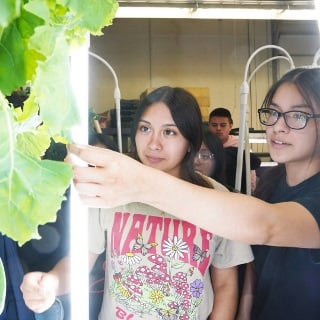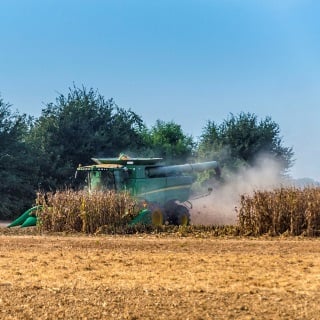Not so long ago, on a perfect Midsouth day, the Farm Credit team took a common opportunity to visit one of our customer’s operations. We are fortunate to regularly get an up close and personal look at the broad range of entities that together make up Midsouth agriculture. But on this day, we were in for a treat. Something a little more unique. A little sweeter, if you will. On this day, we got to talk sweet potatoes on Stray Dog Farms.
Right off the bat we should mention that the Dooley family’s farm spreads far beyond their sweet potato crop. The team also grows milo, corn, soybeans, squash, okra, and zucchini. There are about 400 acres devoted to the increasingly popular sweet potato.
Bill Dooley has run the show, along with his right hand, wife Maurica, for about 12 years now. The two are eager to talk sweet potatoes and gave us a lesson on this crop, which admittedly is not the first that comes to mind when you are thinking about Arkansas agriculture.
Sweet potatoes are a fairly expensive, labor-intensive crop to grow. They get their start as seed potatoes in March each year. Then, they’re cut off at the ground and planted into the field. They need to be sprayed every week, but not for weed control. For that, weeds must be chopped. Improvements to fertilizers have enabled a prettier, more “marketable potato,” and boosted yields by about 20 percent as well.
It takes about 80 employees to produce a crop each season. One reason for this is that, although there is machinery that can harvest sweet potatoes, it damages the skin and renders the potatoes less acceptable for the fresh market. Because of this, it is necessary for the team to pick the sweet potatoes by hand. Quality of the crop means everything for this particular vegetable.
“You can have a big crop of ugly potatoes and not do very well,” Dooley notes. “But a smaller crop of good-looking potatoes will do very well.”
Stray Dog Farms produces about 10,000 one thousand-pound boxes of sweet potatoes each season. When he started, the farm might produce about 20 of the aforementioned 1,000 boxes per acre. Today, they are yielding about 25.6. These are separated into three distinct categories:
- Jumbo: Found in restaurants
- #1: Found in grocery stores
- #2: Sent to canneries
Anything smaller is tilled back into the ground on the farm. The Dooleys have found that just about every crop they grow seems to do better behind sweet potatoes.
The sweet potato market is growing by leaps and bounds, and for good reason. The versatile vegetable is not only healthy, but also delicious. The Dooley’s sweet potatoes are marketed all over the country and in Canada. Bill likes to share the story that his daughter, who lives in Denver, can purchase and enjoy Stray Dog Farms’s sweet potatoes from her local grocery store. You’ll likely find them in your local Kroger and Walmart stores.
The Farm Credit Connection
It is with the Association’s help he was able to access a 200,000 square-foot warehouse he shares with other growers. As we spoke, Bill reflected on the farm’s experience three years ago, when a relentless rain set in. The weather event left the Dooleys unable to harvest potatoes that season. He credits Farm Credit for sticking by them. That support enabled Stray Dog Farms to have a great season the following year. Dooley appreciates the relationship with Farm Credit’s Stanley Mitchell, who he says is many times “a step ahead” when it comes to anticipating what the demands of the operation.
What's in a Name?
We couldn’t let the chance pass to ask about the unique name of the Dooley’s operation. Turns out, though the farm has been around for a little more than 12 years, the family changed the name to Stray Dog Farms about three years ago. Why, you ask? The answer is really quite literal. It seems the farm shop became something of a dumping ground for stray dogs. For whatever reason, people saw fit to leave behind their unwanted or homeless pups. Bill says he houses and cares for between 10 and 12 dogs at the shop at any given time. As if you needed any more reason to love the Dooleys.






